 |
Convert H264 to Xvid
|
H264 to Xvid Converter Software converts H264 files to Xvid
fast. Xvid offers outstanding quality and performance clearly surpassing expensive,
competing products. Xvid allows you to create video for interoperable exchange
with portable or home multimedia devices as Xvid is widely supported in hardware.
Being open-source, Xvid is future-proof and secure to use.
Besides H264 and Xvid, the converter also supports common and uncommon video
and audio formats and protable devices such as AAC, FLAC, M4B (MPEG-4 audiobook), iPhone, Android Phone, SPX (Speex), Android Tablet, etc. It could convert
VOB to AC3, WebM to FLAC, MP4 to Windows Phone, VOB to ASF, FLV to AAC, and so on.
H264 to Xvid Converter Software supports batch conversion and, is
full compatible with 32-bit and 64-bit editions of Windows 10/8/7/Vista/XP/2000.

What is H264?
H.264 is a codec used to create MP4 files. Its wide compatibility and range
of features has made it a popular encoder for videos. The standardization
of the first version of H.264/AVC was completed in May 2003. The final
drafting work on the first version of the standard was completed in May
2003. Specified in Annex H of H.264/AVC, MVC enables the construction of
bitstreams that represent more than one view of a video scene. Compression
efficiency depends on video algorithmic implementations, not on whether
hardware or software implementation is used. Constrained Baseline Profile
(CBP): Primarily for low-cost applications, this profile is most typically
used in videoconferencing and mobile applications. It corresponds to the
subset of features that are in common between the Baseline, Main, and High
Profiles. The 2nd generation Intel Core i processors i3/i5/i7 (code named
"Sandy Bridge") introduced at the January 2011 CES (Consumer
Electronics Show) offer an on-chip hardware full HD H.264 encoder. The
Intel marketing name for the on-chip H.264 encoder feature is "Intel
Quick Sync Video". It is thus common to refer to the standard with
names such as H.264/AVC, AVC/H.264, H.264/MPEG-4 AVC, or MPEG-4/H.264 AVC,
to emphasize the common heritage. CPU based solutions are known to be much
more flexible, particularly when encoding must be done concurrently in
multiple formats, multiple bit rates and resolutions (multi-screen), and
possibly with additional features on container format support, advanced
integrated advertising features, etc. Specified in Annex G of H.264/AVC,
SVC allows the construction of bitstreams that contain sub-bitstreams that
also conform to the standard, including one such bitstream known as the
"base layer" that can be decoded by a H.264/AVC codec that does
not support SVC.
What is Xvid?
Video clip or movie encoded using Xvid, an open-source video codec published
under the GNU GPL license; compresses video data using MPEG-4 technology;
allows for faster data transmission and more efficient storage of video
files. The codec is capable of stripping video data of unnecessary junk
and ensures higher compression rates. To give an example: uncompressed
digital video is huge and requires about 100 GB per hour at PAL resolution.
The same video would require just 500 MB per hour at very high quality
when compressed with Xvid. That is a compression ratio of 200:1. Since
it featured many patented technologies, Xvid 0.9.x versions were confronted
with license barriers in some countries. Xvid encoded files can be written
to a CD or DVD and played in some (not all) DivX compatible DVD players
and media players. However, Xvid can optionally encode video with advanced
MPEG-4 features that most DivX Certified set-top players do not support.
In early 2001, DARC member Sparky wrote an improved version of the encoding
core called encore2. This was updated several times before, in April, it
was removed from CVS without warning. The explanation given by Sparky was
"We (our bosses) decided that we are not ready to have it in public
yet." In July 2002, Sigma Designs released an MPEG-4 video codec called
the REALmagic MPEG-4 Video Codec. Before long, people testing this new
codec found that it contained considerable portions of Xvid code. The codec
is available for free, and it is incorporated in many hardware devices.
An open source MPEG-4 video codec. XviD was created to offer a free alternative
to other commercial video codecs.
How to Convert H264 to Xvid?
- Free Download H264 to Xvid Conversion
Software
- Install the Program by Step-by-step Instructions
- Launch H264 to Xvid Converter Software
- Choose H264 Files
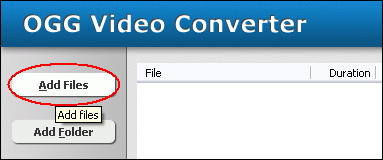
Click "Add Files" to choose H264 files.
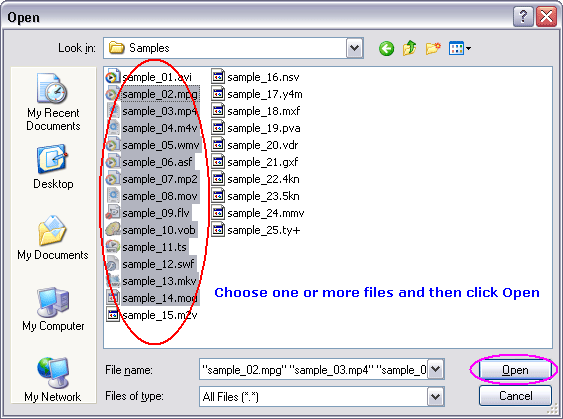
Choose one or more H264 files you want to convert and then click Open.
H264 to Xvid Converter Software will open H264 files and get file
information of the file such as width, height, frame rate, video bit rate, audio
sample rate, audio bit rate, audio channels, and then display the information
of H264 file at conversion list.
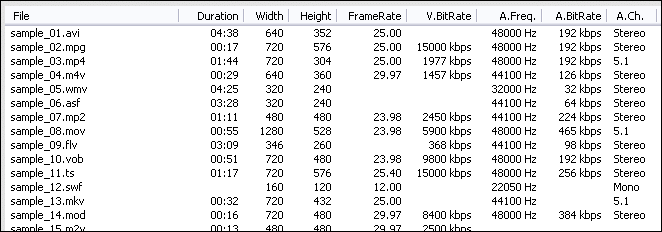
- Choose Output Format
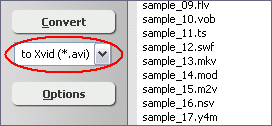
Click on combo box of output format and then choose "to Xvid".
- [Optional, for advanced user]
Set Xvid Encoding Parameters
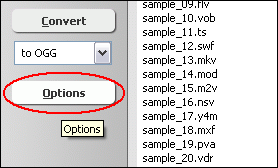
If you want to change Xvid encoding parameters such as bit rate, frame rate, video
size, and aspect ratio, please click "Options".
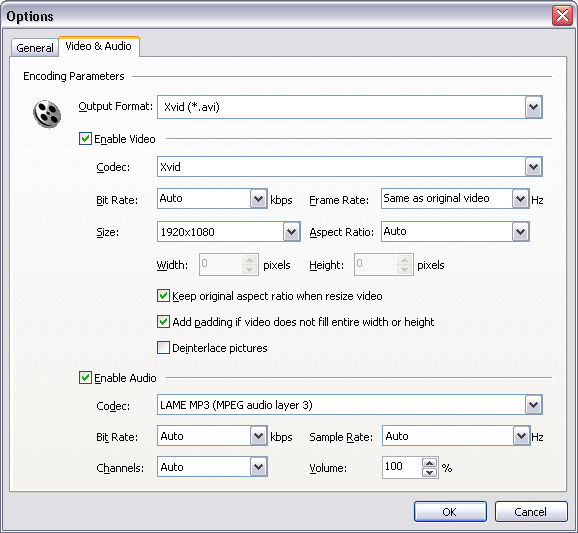
And then, switch to tab "Video & Audio" and choose "Xvid
(*.avi)" at "Output Format", and then set options for
video and audio.
- Convert H264 to Xvid
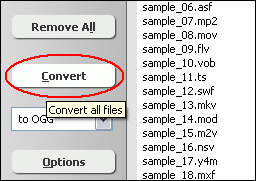
Click "Convert" to convert all H264 files in list to Xvid format.

The software is converting H264 files to Xvid.
- Play and Browse Xvid File
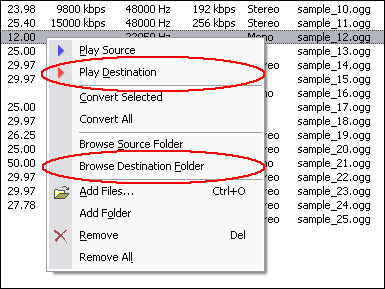
When conversion completes, you can right-click converted item and choose "Play
Destination" to play the outputted Xvid file; or choose "Browse
Destination Folder" to open Windows Explorer to browse the outputted Xvid
file.
- Done
Top
H264 to Xvid Converter Software is 100% clean and safe to
install. It's certified by major download sites.

Convert H264 to Xvid Related Topics:
|











